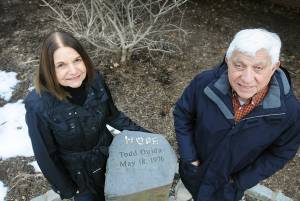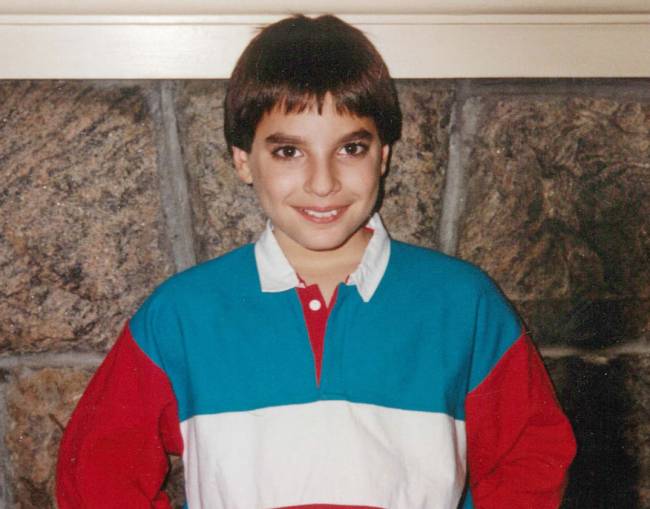Kara Yorio The Record
Anxiety is the most prevalent psychiatric illness among children and teens. As many as 1 in 4 are affected by an anxiety disorder at one or more times in their lives, according to mental health experts. Even when the symptoms are similar, every situation is unique; every child and family have their own challenges and ways of handling them.
Andrea Ouida knew something was seriously wrong when her 9-year-old son Todd was clutching the dining room table, desperate not to leave their River Edge house for school. This was not the typical attempt to get out of a day of fourth grade.
Her husband, Herb, though, thought if he forced Todd to go to school, his son would get over whatever was bothering him. Just make him go. At the time, Herb admits, he didn’t understand the issue or its severity.
“We learned the hard way, because even I, with Todd, at first denied that there was a real problem,” Herb said. “I tried to carry him into school and the custodian came up and said, ‘Your son is suffering.’ The custodian told me.
“I realized then that Todd was in trouble.”
Todd Ouida was 9 in 1985 when the panic inexplicably struck and he was terrified to go to school. In 2001, working for Cantor Fitzgerald, he was killed at the World Trade Center on 9/11. He was 25.
His parents are left to tell his story and fight for awareness, research and help for children with anxiety and depression through the Todd Ouida Children’s Foundation they began in his memory.
But Todd’s thoughts on his battle are not lost. Through his college essay in his application to the University of Michigan, he offers insight into what turned into 2½ years of not being able to go to school beginning in the fourth grade, fighting to overcome severe anxiety.
“I woke up one morning, and didn’t want to go to school,” Ouida wrote. “It wasn’t the ordinary ‘I don’t feel like it’ attitude, but it was that I was scared to go to school. My stomach was tight and I, for a reason that will most likely never be explained, was terrified. I went to school, and barely made it through the day, convincing myself it was just a stomach ache. … All I knew was that I was frightened, and I wasn’t coming back tomorrow. What I didn’t know was that it was every tomorrow for the next two and a half years.”
The family got him a tutor and took him to a psychiatrist for therapy. That doctor also prescribed medication.

Andrea and Herb Ouida at the marker for their son, Todd, at the Memorial Garden at the River Edge Public Library. Photo – Mitsu Yasukawa; The Record
“It didn’t help,” Andrea said of the medication. “It didn’t do anything.”
“He lost weight,” said Herb, who still regrets taking the doctor’s advice. “I always say this when I speak about it, medication has changed dramatically. It’s much improved today. But it didn’t work, and my wife and I decided to try another route, another doctor.”
Todd began to see an Englewood psychiatrist four times a week, at first only able to stay for five minutes.
“We would drive 20 minutes, stay five, pay whatever and drive 20 minutes home,” Andrea said.
Todd still had his close friends and the kids in the neighborhood, but he had only a few places he felt comfortable. One was the River Edge Diner, where his mother would take him once a week just to get him out of the house.
“It was very difficult if we went other places,” she said.
Meanwhile, she dealt with the inquiries, opinions and advice of friends and family.
“There were a lot of questions,” she said. “Some people thought he was being manipulative. People had a lot of theories.”
The family, the entire family, suffered along with Todd.
“We would all get in the car, we were going someplace, and Todd would say, ‘I can’t go,’ ” Andrea said.
“That caused the other two children to resent him,” Herb said of Todd’s two older siblings. “He just destroyed the whole day. They were very angry at him.”
Despite the difficulties in the family, Todd wrote that he felt their support.
“It’s 1986 and I haven’t sat through a full class in one and a half years,” he wrote. “It was auspicious that the school, along with my family and close friends, never gave up on me. This left me with no chance to give up on myself. I wanted so bad to go back to school and be normal like my friends, unfortunately I had no choice but to accept that I wasn’t yet ready to go back full time.”
Todd eventually went to school for one hour with the child study team, then he attended one class — math, his favorite — in the afternoon.
“The first thing that goes through many people’s heads is that if Todd can do it for an hour, then why can’t he do it for a whole day?” Todd wrote. “In 1986 I would have given my life to have been able to answer that question.”
It was one of many questions left unanswered. The family never found out what caused the anxiety, and while Herb and Andrea maintain competing theories and can’t help still wondering, they admit it doesn’t really matter anymore. All they know is one day he could not go to school. Then nearly three years later, he was ready to go back.
“In those days we had junior high, seventh, eighth and ninth grade, and he told us, ‘I’ll go to junior high school,’ ” said Andrea. “And he did. That was it.”
The day he returned to school was one his parents will never forget.
“It was like a miracle,” said Herb. “It was such a great, great, great day. I gotta tell you, just to get on the bus and go to school, what a simple thing it is. We were both so happy.”
Todd “never looked back,” according to his parents. If he dealt with anxiety later, he never told them, and it never noticeably disrupted his life. He didn’t talk about what the family always just referred to as “the problem” often, but his mother said he would bring it up with individuals who might benefit from his experience — maybe anxious kids at camp or whom he saw in his job as a lifeguard.
“I don’t know how he would feel about us telling his story,” Herb said. “But I think we need to share his story because his story is a source of hope.”
________________
Formed soon after River Edge’s Todd Ouida died in the 9/11 attacks on the World Trade Center, the foundation’s missions are:
– To financially support psychological services for children of families in need and promote mental health initiatives for all children.
– To raise awareness and reduce the stigma of anxiety and depression disorders in children, recognizing the need for early intervention.
– To provide contact information for those seeking help.
“I think we knew almost immediately that this is what we would do, this is where our energy would go,” Todd’s father Herb said.
The foundation has grown beyond those missions to support research, lectures and childhood programs.
It provides funding to “Zippy’s Friends,” a school-based mental health promotion curriculum for kindergarten and first-grade children that is used in North Jersey and around the world. The foundation also presents annual clinical lectures at Montclair State University and the University of Michigan and, at Michigan, funds the Todd Ouida Clinical Scholars Awards, “designed to further the work of outstanding young researchers working in childhood anxiety and depression.”
This series focuses on how anxiety affects North Jersey kids, their families, school systems and the mental health community. If you have questions or want to share your story, contact Kara Yorio at yoriok@northjersey.com


